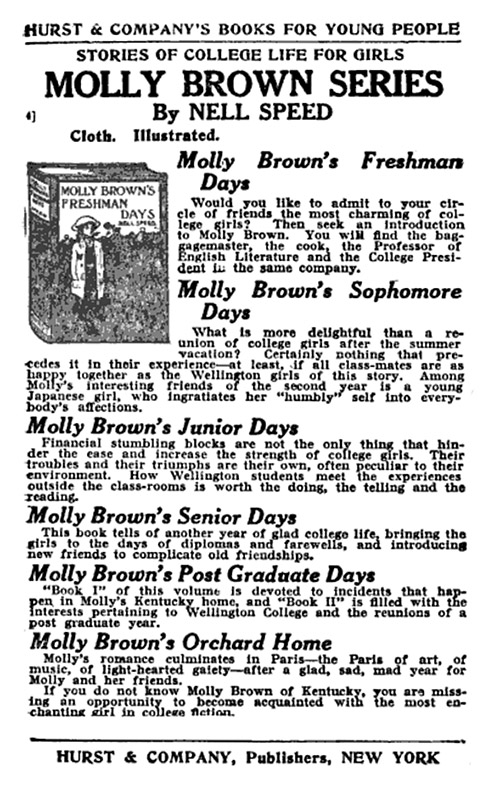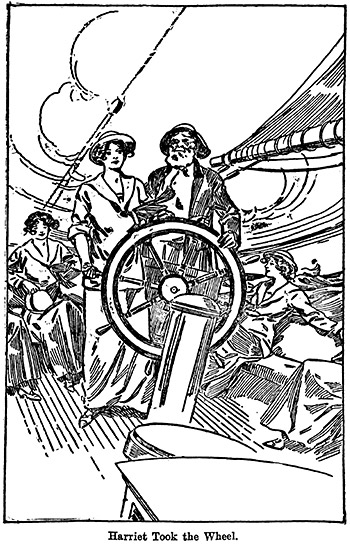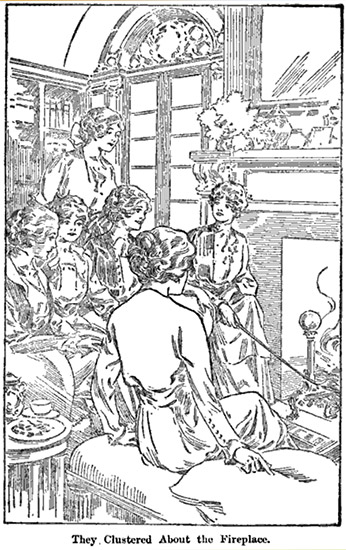The Muses on the Hearth
F.G. Allinson, The Unpopular Review, July–September, 1914
The images accompanying the reprint of “Muses on the Hearth,”
are from various, unrelated, period sources.
“How to be efficient though incompetent” is the title suggested by a distinguished psychologist for the vocational appeals of the moment. Among these raucous calls none is more annoying to the ear of experience than the one which summons the college girl away from the bounty of the sciences and the humanities to the grudging concreteness of a domestic science, a household economy, from which stars and sonnets must perforce be excluded. We have, indeed, no quarrel with the conspicuous place now given to the word “home” in all discussions of women’s vocations. Suffragists and anti-suffragists, feminists and anti-feminists have united to clear a noble term from the mists of sentimentality and to reinstate it in the vocabulary of sincere and candid speakers. More frankly than a quarter of a century ago, educated women may now glory in the work allotted to their sex. The most radical feminist writer of the day has given perfect expression to the home’s demand. Husband and children, she says, have been able to count on a woman “as they could count on the fire on the hearth, the cool shade under the tree, the water in the well, the bread in the sacrament.” We may go farther and say that our high emprise does not depend upon husband and children. Married or unmarried, fruitful or barren, with a vocation or without, we must make of the world a home for the race. So far from quarrelling with the hypothesis of the domestic scientists, we turn it into a confession of faith. It is their conclusions that will not bear the test of experience. Because women students can anticipate no more important career than home-making, it is argued that within their four undergraduate years training should be given in the practical details of house-keeping. Any woman who has been both a student and a housekeeper knows that this argument is fallacious.
 |
| Molly Brown College Girl series advertisement. From Matthew M. Coltons’ Frank Armstrong at College (New York: Hurst and Company, 1914), 306. |
Before examining it, however, we must clear away possible misunderstandings. Our discussion concerns colleges and not elementary schools. Those who are loudest in denouncing the aristocratic theory of a college education must admit that colleges contain, even today, incredible as it sometimes seems, a selected group of young women. It is also true that the High Schools contain selected groups. Below them are the people’s schools. The girls who do not go beyond these are to be the wives of working men, in many cases can learn nothing from their mothers, and before marriage may themselves be caught in the treadmill of daily labor. It is probable that to these children of impoverished future we should give the chance to learn in school facts which may make directly for national health and well-being. But the girls in the most democratic state university in this country are selected by their own ambition, if by nothing else, for a higher level of life. Their power and their opportunities to learn do not end on Commencement Day. The higher we go in the scale of education, until we reach the graduate professional schools, the less are we able and the less need we be concerned to anticipate the specific activities of the future.
Furthermore, we are discussing colleges of “liberal” studies, not technical schools. Into the former have strayed many students who belong in the latter. The tragic thing about their errantry is that presidents and faculties, instead of setting them in the right path, try to make the college over to suit them. The rightful heirs to the knowledge of the ages are despoiled. The most down-trodden students are those who cherish a passion for the intellectual life. Among these are as many women as men. If domestic science were confined to separate schools, as all applied sciences ought to be, we should have nothing but praise for a subject admirably conceived, and often admirably taught. In these schools it may be studied by such High School graduates as prefer to deal with practical rather than with pure science, and, in a larger way, by such college graduates as wish to supplement theory with practice for professional purposes. But in liberal colleges domestic science is but dross handed out to seekers after gold. Against its intrusion into the curriculum no protest can be too stern.
Faith in this study seems to rest upon the belief that the actual experiences of life can be anticipated. This is a fallacy. There is no dress rehearsal for the rôle of “wife and mother.” It is a question of experience piled on experience, life piled on life. The only way to perform the tasks, understand the duties, accept the joys and sorrows of any given stage of existence is to have performed the tasks, learned the duties, fought out the joys and sorrows of earlier stages. In so far as “housekeeping” means the application of principles of nutrition and sanitation, these principles can be acquired at the proper time by an active, well-trained mind. The preparation needed is not to have learned facts three or five or ten years in advance, when theories and appliances may have been very different, but to have taken up one subject after another, finding how to master principles and details. This new subject is not recondite nor are we unconquerably stupid. To learn as we go—discere ambulando—need not turn the home into an experiment station.
 |
| Janet Aldridge, The Meadow-Brook Girls by the Sea or The Loss of the Lonesome Bar (Philadelphia: Henry Altemus Company, 1914), 209. |
But “every woman knows” that housekeeping, when it is a labor of love and not a paid profession, goes far deeper than ordering meals or keeping refrigerators clean, or making an invalid’s bed with hospital precision. We are more than cooks. We furnish power for the day’s work of men, and for the growth of children’s souls. We are more than parlor maids. We are artists, informing material objects with a living spirit. We are more even than trained nurses. We are companions along the roads of pain, comrades, it may be, at the gates of death. Back of our willingness to do our full work must lie something profounder than lectures on bacteria, or interior decoration, or an invalid’s diet or a baby’s bath. Specific knowledge can be obtained in a hurry by a trained student. What cannot be obtained by any sudden action of the mind is the habit of projecting a task against the background of human experience as that experience has been revealed in history and literature, and of throwing into details the enthusiasm born of this larger vision. She is fortunate who comes to the task of making a home with this habit already formed. Her student life may have cast no shadow of the future. When she was reading Æschylus or Berkeley, or writing reports on the Italian despots, or counting the segments of a beetle’s antennæ, she may not have foreseen the hours when the manner of life and the manner of death of human beings would depend upon her. She was merely sanely absorbed in the tasks of her present. But in later life she comes to see that in performing them, she learned to disentangle the momentary from the permanent, to prefer courage to cowardice, to pay the price of hard work for values received. Age may bring what youth withholds, a sense of humor, a mellow sympathy. But only youth can begin that habitual discipline of mind and will which is the root, if not of all success, at least of that which blooms in the comfort of other people. Carry the logic of the vocation-mongers to its extreme. Grant that every girl in college ought someday to marry, and that we must train her, while we have her, for this profession. Then let the college insist on honest work, clear thinking and bright imagination in those great fields in which successive generations reap their intellectual harvest. Captain Rostron of the Carpathia once spoke to a body of college students who were on fire with enthusiasm for the rescuer of the Titanic’s survivors. He ended with some such words as these: “Go back to your classes and work hard. I scarcely knew that night what orders were coming out when I opened my mouth to speak, but I can tell you that I had been preparing to give those orders ever since I was a boy in school.” Many a home may be saved from shipwreck in the future because today girls are doing their duty in their Greek class rooms and Physics laboratories.
But this fallacy of domesticity probes deeper than we have yet indicated. It is, in the last analysis, superficial to ticket ourselves off as house-keepers or even as women. What are these unplumbed wastes between housekeepers and teachers, mothers and scholars, civil engineers and professors of Greek, senators and journalists, bankers and poets, men and women? A philosopher has pointed out that what we share is vastly greater than what separates us. We walk upon and must know the same earth. We live under the same sun and stars. In our bodies we are subject to the same laws of physics, biology and chemistry. We speak the same language, and must shape it to our use. We are products of the same past, and must understand it in order to understand the present. We are vexed by the same questions about Good and Evil, Will and Destiny. We all bury our dead. We shall all die ourselves. Back of our vocations lies human life. Back of the streams in which we dabble is that immortal sea which brought us hither. To sport upon its shore and hear the roll of its mighty waters is the divine privilege of youth.
If any difference is to be made in the education of boys and girls, it must be with the purpose of giving to future women more that is “unvocational,” “unapplied,” “unpractical.” As it happens, such studies as these are the ones which the mother of a family, as well as a teacher or writer, is most sure to apply practically in her vocation. The last word on this aspect of the subject was said by a woman in a small Maine town. Her father had been a day laborer, her husband was a mechanic. She had five children, and, of course, did all the house-work. She also belonged to a club which studied French history. To a foolish expression of surprise that with all her little children she could find time to write a paper on Louis XVI she retorted angrily: “With all my children! It is for my children that I do it. I do not mean that they shall have to go out of their home, as I have had to, for everything interesting.” But the larger truth is that the value of a woman as a mother depends precisely upon her value as a human being. And it is for that reason that in her youth we must lead one who is truly thirsty only to fountains pouring from the heaven’s brink. It might seem cruel if it did not merely illustrate the law of risk involved in any creative process, that the more generously women fulfil the “function of their sex” the more they are in danger of losing their souls to furnish a mess of pottage. The risk of life for life at a child’s birth is more dramatic but no truer than the risk of soul for body as the child grows. In the midst of petty household cares the nervous system may become a master instead of a servant, a breeder of distempers rather than a feeder of the imagination. The unhappiness of homes, the failure of marriage, are due as often to the poverty-stricken minds, the narrowed vision of women as to the vice of men.
Their sense is with their senses all mix’d in,
Destroyed by subtleties these women are.
George Meredith’s prayer for us, “more brain, O Lord, more brain!” we shall still need when “votes for women” has become an outworn slogan.
 |
| Jessie Graham Flower, Grace Harlowe’s Fourth Year at Overton College (Philadelphia: Henry Altemus Company, 1914), 141. |
No one claims that character is produced only by college training or any other form of education. There are illiterate women whose wills are so steady, whose hearts are so generous, and whose spirits seem to be so continuously refreshed that we look up to them with reverence. They have their own fountains. It would be a mistake to suppose that because they are “open at the outlet” they are “closed at the reservoir.” But there is a class of women who are impelled toward knowledge (as still others are impelled toward music or art) and whose success in anything they do will depend upon their state of mind. We ought to assume that the girls who go to college belong to this class, however far from the springs of Helicon they mean to march in the future. It is a terrible thing that we should think of taking one hour of their time while they are in college for any course that does not enrich the intellect and add to the treasury of thoughts and ideas upon which the woman with a mind will always be drawing. Spirit is greater than intellect, and may survive it in the course of a long life. But in the active years, for this kind of woman, the mental life becomes one with the spiritual. A lusty serviceableness will issue from their union. If mental interests seem sterile, the cure, as far as the college is concerned with it, is to deepen, not to lessen the love of learning. The renewal of sincerity, humility and enthusiasm in the age-old search for truth is more necessary than the introduction of new courses, which must be applied to be of value, and which at this time in a girl’s experience, and under these conditions, can give only partial and superficial data.
Our lives are subject to a thousand changes. In the home as well as out of it, we shall meet, face to face, fruition and disappointment, rapture and pain, hope and despair. In these tests of the soul’s health what good will domestic science do us? Not by sanitation is sanity brought forth. Women do not gather courage from calories, nor faith from refrigerators. But every added milestone along the road from youth to age shows us the truth of Cicero’s claim, made after he had borne public care and known private grief, for the faithful, homely companionship of intellectual studies: “For other things belong neither to all times and ages nor all places; but these pursuits feed our growing years, bring charm to ripened age, adorn prosperity, offer a refuge and solace to adversity, delight us at home, do not handicap us abroad, abide with us through the watches of the night, go with us on our travels, make holiday with us in the country.”
Upon women, in crucial hours, may depend the peace of the old, the fortune of the middle-aged, the hopefulness of the young. In such an hour we do not wish to be dismissed as were the women of Socrates’s family, who had had no part in the bright life of the Athens of which he was taking leave. Shall we become the bread in the sacrament of life, ourselves unfed? the fire on the hearth, ourselves unkindled?